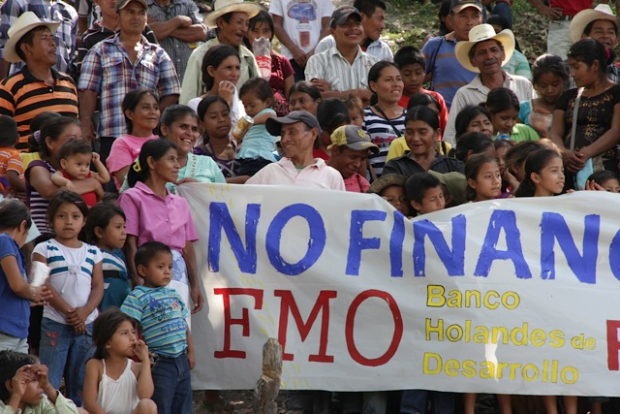
Human Rights Defenders Essential for Development
Development banks should respect human rights in their investments around the world and ensure their activities are not putting human rights and environmental defenders at risk, said SOMO in a joint petition(opens in new window) signed by over 150 development, human rights, and environment groups.
Global Call to Ensure Local Communities’ Safe Participation in Bank-financed Projects
Major development banks have long touted the importance of public participation for effective development, the organizations said. But the space for safe and effective participation in development processes has been rapidly shrinking(opens in new window) as governments criminalize activities by environmental and human rights activists, adopt restrictions on civil society groups, and allow intimidation and attacks by private businesses or security forces to go unpunished.
Lydia de Leeuw, Researcher at SOMO: “It’s important that IFI’s recognize the impact their developments projects have on human rights. Without human rights and safety there can be no sustainable development. Attacks against human rights defenders are on the rise. We urge IFIs to do everything in their power to promote an enabling environment for public participation, where people can safely express their views on development initiatives that affect them.”
The petition is directed to international financial institutions (IFIs), including the World Bank, African, Asian, European, and Inter-American Development Bank, as well as the newest institutions, the Asian Infrastructure Investment Bank, and BRICS New Development Bank.
In March 2016, Berta Cáceres, a renowned indigenous land rights and environmental defender in Honduras, was killed in the middle of the night as she slept in her bed. Two of those facing charges for Cáceres’ murder were employees of a company involved in the construction of the Agua Zarca dam, a project that Cáceres and her organization, Civic Council of Popular and Indigenous Organizations of Honduras (COPINH), have long opposed and campaigned against. The murder sparked a high-profile movement to demand accountability of the Dutch, Finnish, and Central American banks financing Agua Zarca for failure to ensure their investments weren’t fueling human rights abuses.
But as recent reports(opens in new window) have documented(opens in new window) , the Cáceres case is not unique.
The joint petition – International Financial Institutions’ responsibility to ensure Meaningful and Effective Participation in their Investments(opens in new window) – details ways in which the institutions should “ensure that the activities they finance respect human rights and that there are spaces for people to participate in the development of IFI projects and hold IFIs to account without risking their security.” The organizations call on the financial institutions “to actively support the realization of rights to freedom of expression, assembly, and association, and related human rights, including economic, social and cultural rights in all their activities.”
For more information and stories from human rights defenders, please visit: www.rightsindevelopment.org(opens in new window)
Do you need more information?
-

Lydia de Leeuw
Researcher
Partners
-
Coalition for Human Rights in Development
Related content
-
Human Rights and Grievance Mechanisms Published on:J. OldenzielPosted in category:PublicationJ. Oldenziel
-
Failures in due diligence and workers’ rights protectionPosted in category:Opinion
 Joshua RosenzweigPublished on:
Joshua RosenzweigPublished on: Joshua Rosenzweig
Joshua Rosenzweig -
 BREAKING: We are suing the Dutch state for failing to prevent genocide in Gaza and uphold international lawPosted in category:News
BREAKING: We are suing the Dutch state for failing to prevent genocide in Gaza and uphold international lawPosted in category:News Lydia de LeeuwPublished on:
Lydia de LeeuwPublished on:

